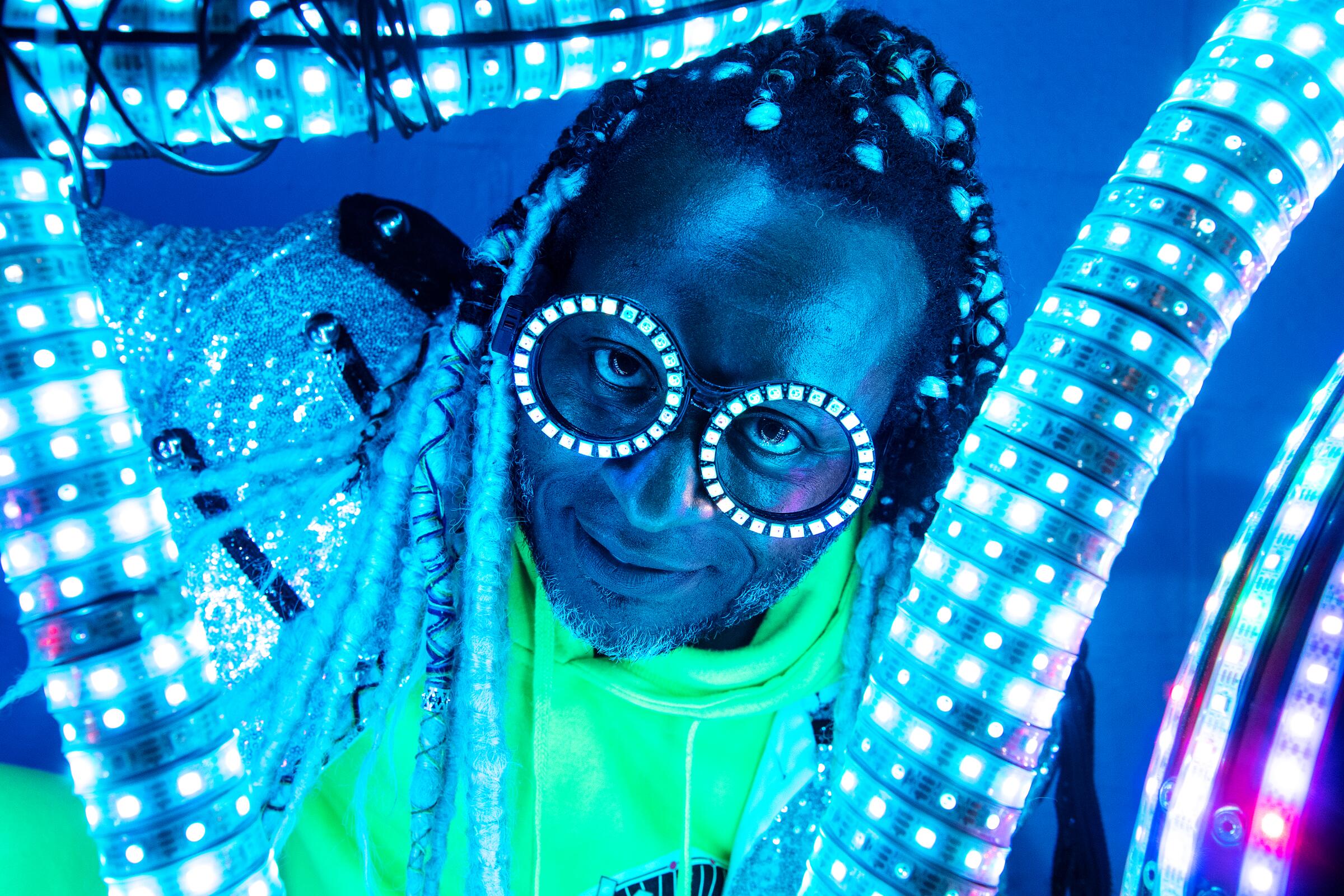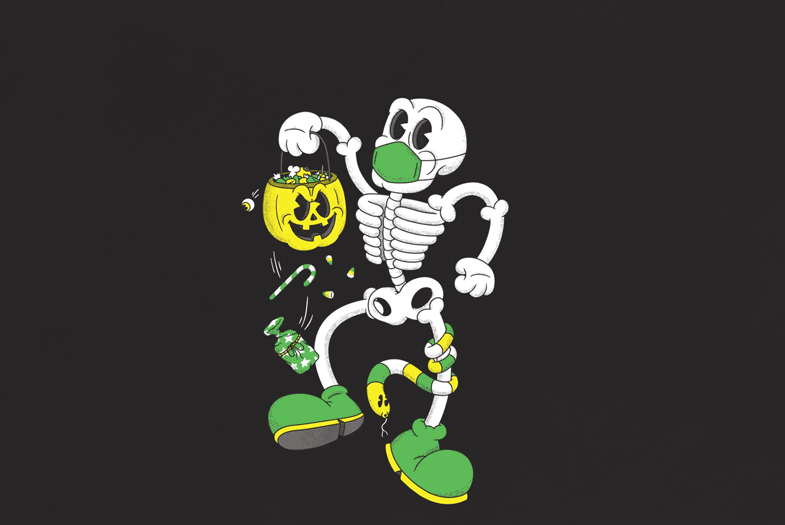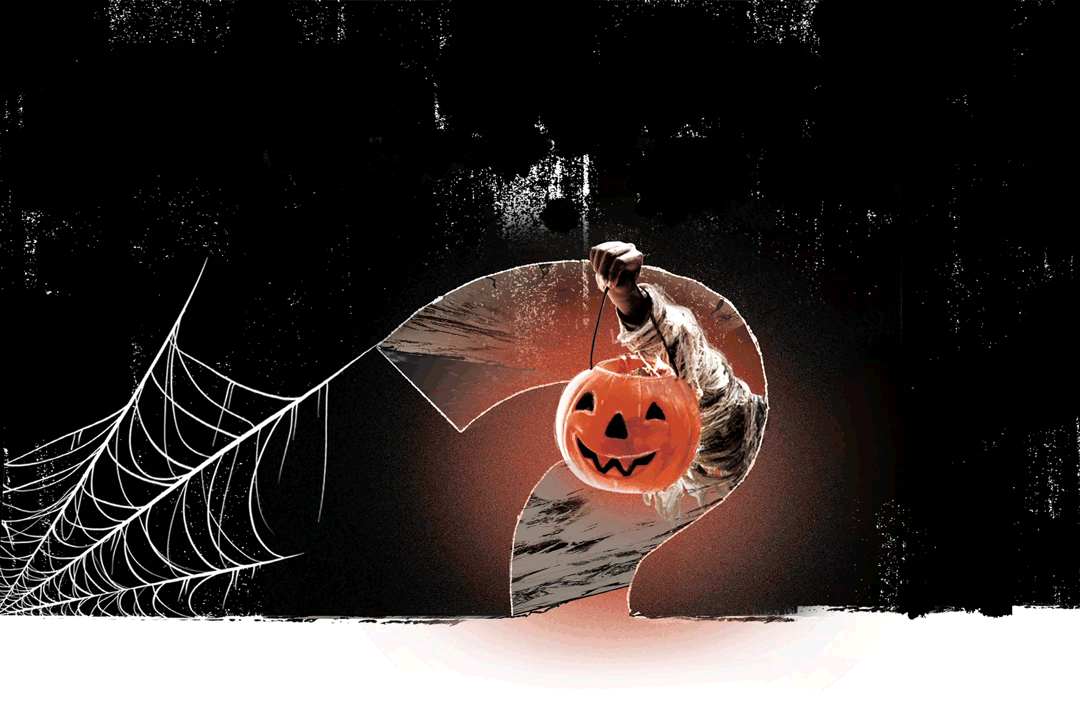Jeanette Marantos is a Features reporter focused primarily on plants, gardening and Southern California’s changing landscapes for the Los Angeles Times. She also writes the monthly L.A. Times Plants newsletter, which includes a calendar of upcoming plant-related events. Email calendar submissions or plant-related story ideas to jeanette.marantos@latimes.com for consideration.
1
It’s Sunday nearing sunset and the daily carnival that is the Venice Beach Boardwalk should be winding down, except here at Windward Plaza Park more people are streaming in than heading for their cars. And they’re all on wheels.
Sebastian “The Light Man” Butler (“Get lit or get hit”) is in his usual Sunday spot, selling $40 strips of LED lights and helping customers with installation. Nearby, a lanky man with shaggy silver hair and in-line skates is riding a bicycle in circles around the park, weaving in and out of the crowd, his skates balanced awkwardly on the pedals. And a glamorous woman with long, auburn locks is frantically tying yet another fabric butterfly onto a bicycle so laden with purple and pink wings, lights and streamers it’s hard to tell there’s a bike there at all.
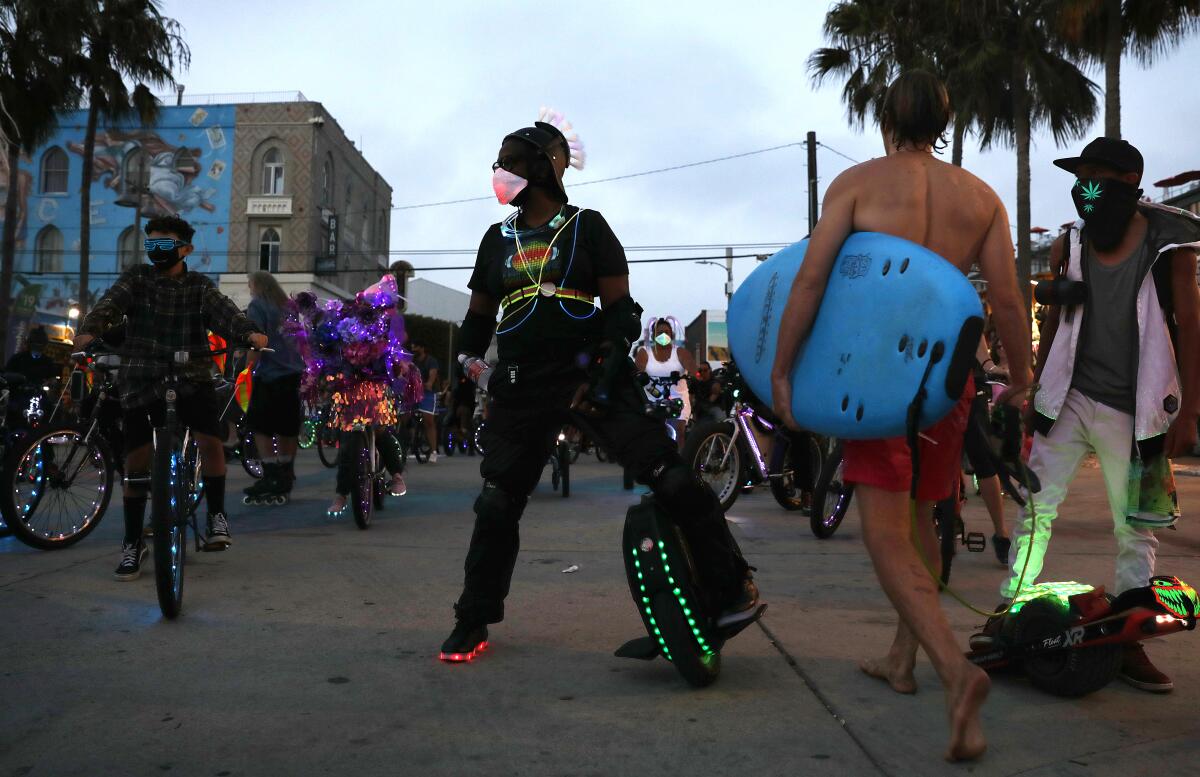
(Christina House / Los Angeles Times)
Nearby, surrounded by music at chest-thrumming volume, James Lightning, a tall, imposing man best known as Mad, stands quietly by his black electric bicycle that’s towing a trailer with a huge speaker on the back and an iPad attached to the front so he can easily control his tunes and his lights. He’s dressed all in black, from his helmet to his mask to his baggy jacket and pants, and people speak about him reverentially because he is a Venice legend, the man credited with making in-line skating an art on the boardwalk in the 1980s and lauded in a documentary about that time called “Roller Dreams.” Awestruck people point him out in whispers, giving him wide berth, and Mad, who is friendly to anyone who approaches him, otherwise lets his music do the talking.
With many traditional public events canceled due to coronavirus, all our holiday energy has to go somewhere. And so far it appears 2020 will be the year we go wild on holiday decorations, starting with Halloween.
More bikes with sound systems arrive, blaring R&B and salsa, along with people on skateboards wearing elaborately lit-up backpacks. As the sky darkens, the lights get flashier, and the din makes all conversations shouted.
And in the midst of the cacophony strides perhaps the only man with the power to summon the Light Man and Mad and nearly 300 other people from all over Southern California on this Labor Day weekend. He’s wearing round light-up glasses that twirl with color and fluorescent workout clothes in a color he calls highlighter yellow. Even the soles of his shoes are flashing fluorescent.
This is the Captain, recognizable by his long, white dreadlocks woven with beads and hair jewelry that represent the things he loves — horses, trees, fish and, of course, bicycles. The Captain, a.k.a. Marcus Gladney, 46, is the founder of this 5-year-old weekly descent into joyful madness, the Venice Electric Light Parade, which takes place each Sunday at dusk, open to anyone with wheels and a desire for fun.
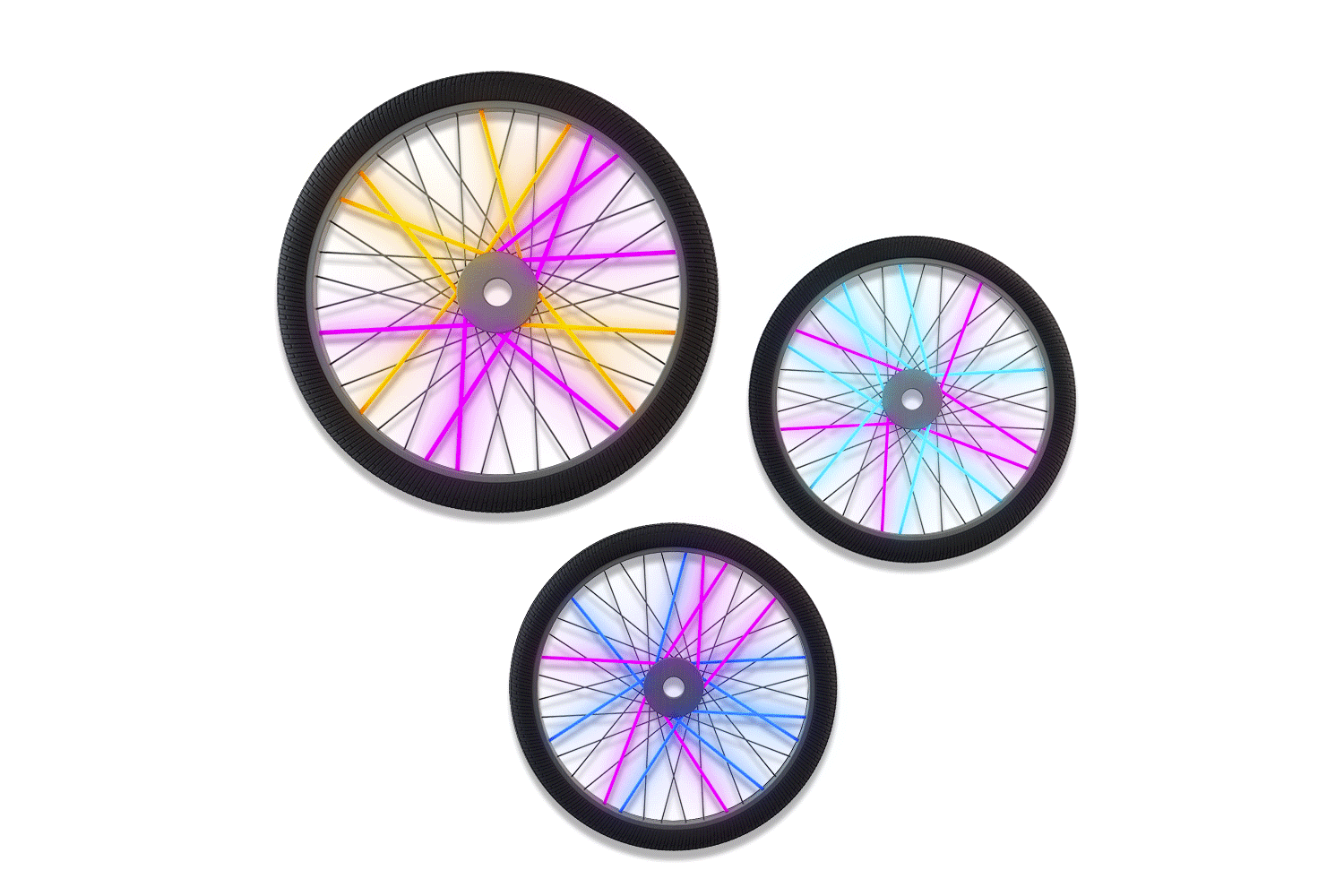
(Ana Gómez Bernaus / For The Times)
As sunset approaches, the voices and music merge into a quieter hum; we are waiting for the signal to start. Dozens of people on one, two and four wheels are turning on their lights and looking expectantly toward Gladney’s massive beach bike, Big Red, which looks like it’s been dipped in LED lights — 5,000 to be exact — wrapped around the spokes and handlebars and every inch of frame. Like Mad, Gladney has a trailer attached to his bike to carry his speakers and a battery to power his lights. Unlike Mad, Gladney’s bike is not motorized; he has to pedal and keep at the front of the pack.
The signal comes about 7 p.m. Gladney plays the parade’s theme song — “Sundays@Sunset” by his girlfriend’s daughter Meilin Chen Fefee and William Barry — as people jostle toward the front of the crowd, and then Edith Piaf’s “La Vie en Rose” blares from Gladney’s speaker, one of the official start songs for the parade. Gladney flips on his lights, making Big Red glow like a celestial being, and there is a momentary, dumbfounded hush. Then he’s off, riding west on the bike path toward the Santa Monica Pier, with at least 100 other dazzling riders whooping and zooming in his wake.
Labor Day is here, the unofficial end of summer and the time of year we start looking toward holiday festivities. But not this year: Coronavirus concerns are canceling popular Halloween and holiday light shows around Southern California.
The Electric Light Parade, arguably one of L.A.’s least known and most beloved traditions, is Gladney’s brainchild, and he tends it faithfully every Sunday. The only times it’s been canceled were for rain or for a few months this spring, when the beaches were closed due to the coronavirus.
Gladney said he was 40, owner of a carpet-cleaning and water-extraction business, when he left his hometown of Kansas City, Mo., to move to Los Angeles in 2014, partly to follow a then-girlfriend’s Hollywood dreams and partly to find a niche for himself.
After six months, she’d had enough and went home.
“I’m still here,” Gladney said.
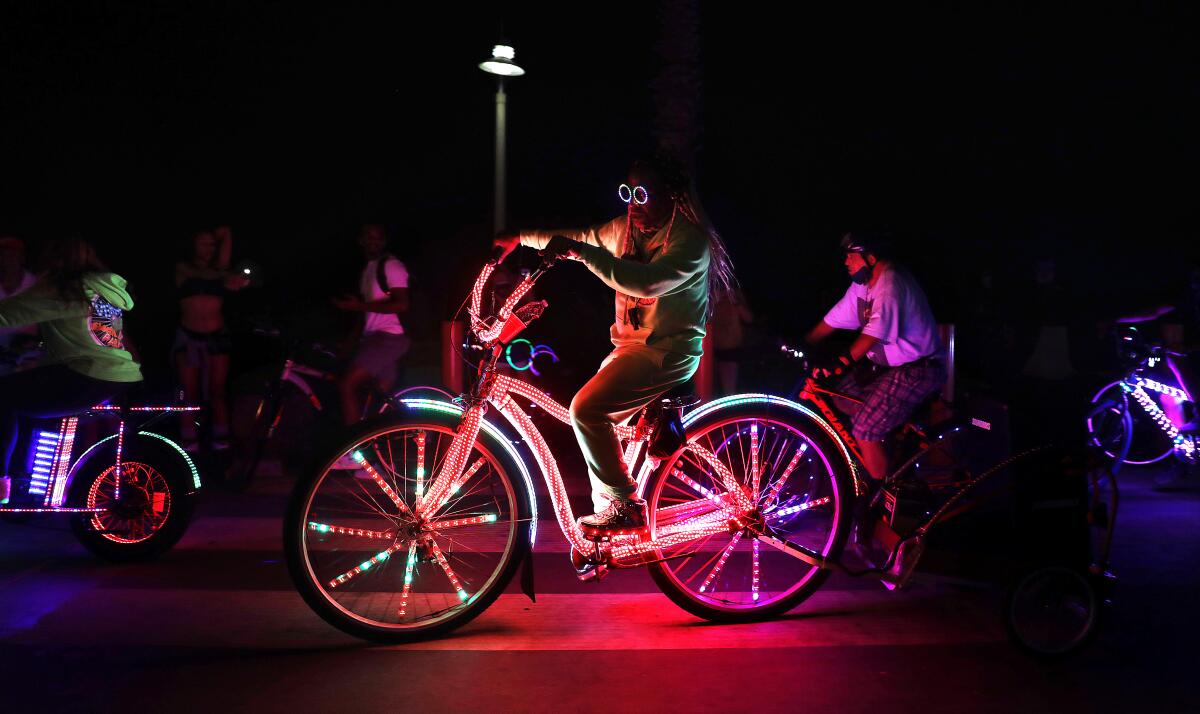
When Marcus Gladney lights up the 5,000 LEDs on his bike, Big Red, it glows like a celestial being.
(Christina House / Los Angeles Times)
Those first few months after their breakup were lonely, Gladney said. He didn’t know anyone. But every day, all day, he spent his time at Venice Beach. “I was enjoying the culture, the boardwalk, the people, the music, the incense burning. ... Venice Beach is my heart.”
He wasn’t bicycling at that point; he hadn’t since he was a kid. And every day, he’d leave the beach at sunset, “because everyone said, ‘Don’t be in Venice after sunset; it gets crazy.’”
But home was lonely — a small apartment with nothing to do — and after several weeks, Gladney said he got curious. “I made up my mind to stay at the beach and see what happens at night. And that’s when I started seeing all these people riding bicycles with lights on their wheels. It was an amazing sight. I asked a guy, ‘Where do you get these lights from? And he said, ‘Sebastian the Light Guy.’ And the next day, I bought a bike and started riding.”
Can we safely celebrate Halloween this year, in the midst of a pandemic? Gatherings aren’t safe, and do you really want your children knocking at doors, begging for candy and grabbing from the same bowl? Americans stuck at home have plenty of time to come up with some creative — and safe — solutions.
Then he found Butler and spent $20 that night on two 7-foot strings of LED lights to wrap around his wheel spokes. More important, Gladney had found a friend, hanging out with Butler as he sold his LEDs and eventually helping him install lights on customers’ wheels. Butler used his own light-decorated bike to lure customers, and Gladney soon learned the Light Man had a following among local celebrities who preferred to ride their bikes at night, under cover of darkness.
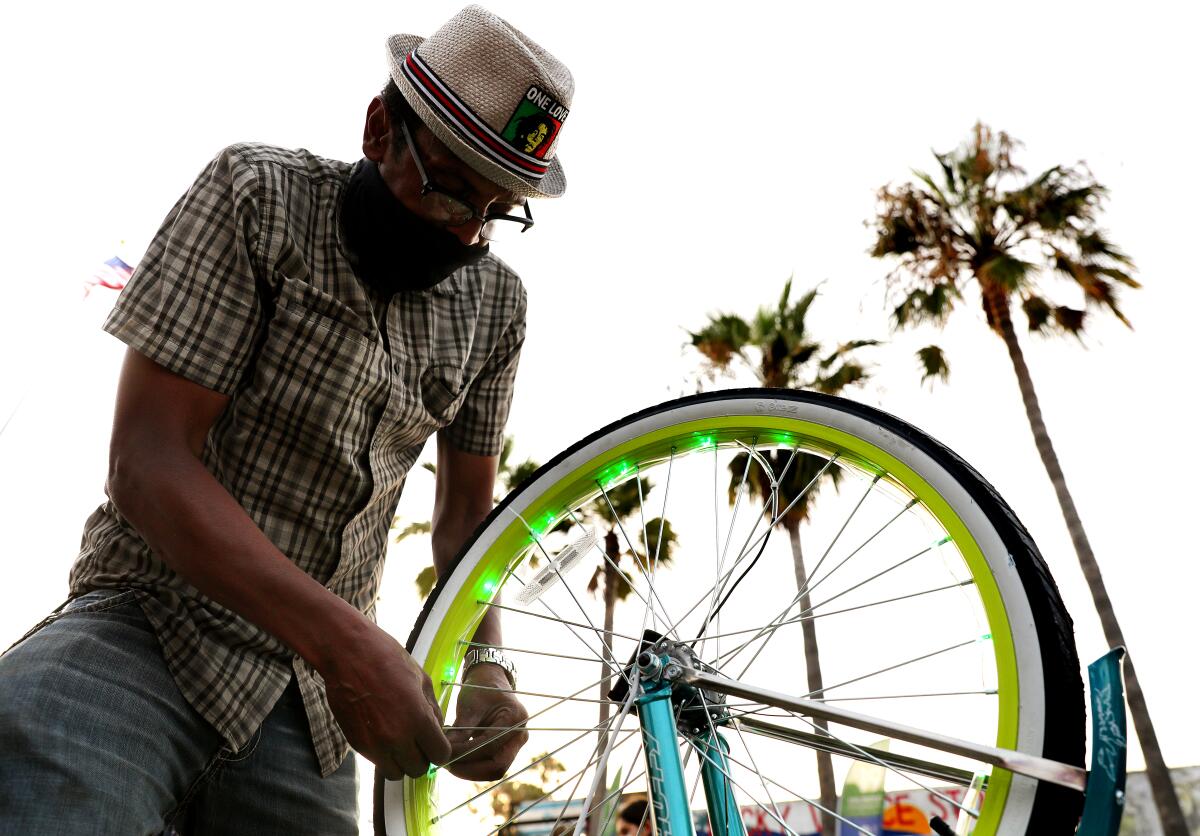
Sebastian “The Light Man” Butler outfits a bicycle with strips of LED lights before the Venice Electric Light Parade.
(Christina House / Los Angeles Times)
“I was amazed at all the celebrities he knew,” Gladney said. One night, three men in suits asked how much it would cost to rent their bikes for a scene in a new late-night talk show. “I looked at Sebastian and he said, ‘$100 apiece.’”
The following evening at Windward Plaza a British guy stepped out of a black Mercedes-Benz. “He introduced himself as James Corden and said he was starting a new show called ‘The Late Late Show,’” Gladney recalled. “I said, ‘Who’s going to be up to watch it?’ And he said, ‘Hopefully everybody, mate.’”
Corden got on Gladney’s bike, and the plan was for him to ride it in circles around the plaza for the cameras. “He was riding in these hard-soled dress shoes, his feet slipping off the pedals, and I was thinking to myself, ‘Please don’t wreck on my bike.’”
After the Corden encounter, Gladney said he began to see many more LED possibilities. He put multiple strands of lights on his wheels and frame, mixing red and yellow “so the bike looked like it was on fire.” People reacted with delight, Butler got more sales, and Gladney had an epiphany.
“These lights make people happy. They made me really happy when I first saw them,” he said, “so I asked Sebastian, ‘Has anyone ever started an organized biking event with lights?’ And nobody had, because nobody had the vision.”
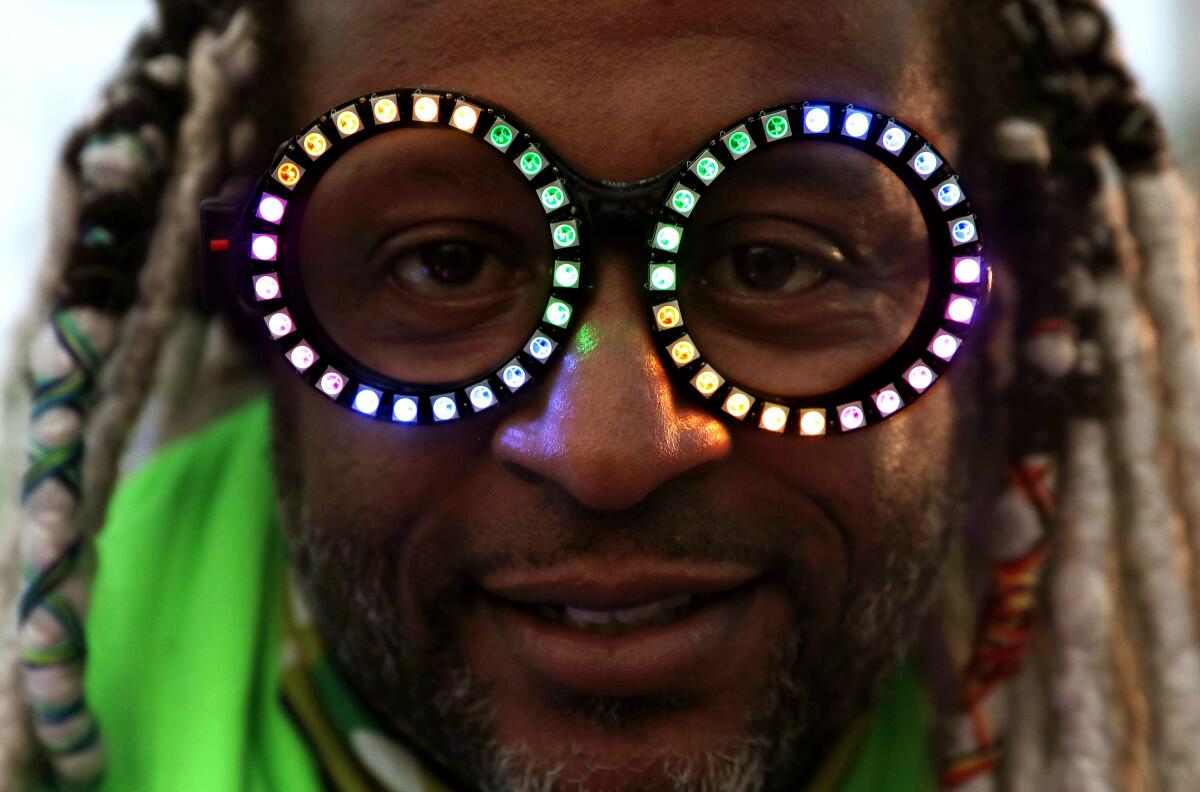
Marcus Gladney, founder of the Venice Electric Light Parade, wears eyeglasses outfitted with lights.
(Christina House / Los Angeles Times)
And that’s how the Venice Electric Light Parade began in November 2015: Gladney riding his bike in the Venice dusk, inviting others to join, for free, every Sunday at sunset.
The first group had about 60 riders, but it didn’t take long for the numbers to grow. Now it’s normally 100 to 150 riders, he said, and on Labor Day weekend the number swelled to 300.
“I said, ‘I’m going to start a bicycle parade for everyone, and I’ll be like Willy Wonka and the Pied Piper combined,’” he said. “Willy Wonka is my favorite, my absolute favorite, with all the colors and magic and making people feel welcome. ... I’m talking the Gene Wilder version now, the other is too dark.”
::
Riding in the parade is both thrilling and terrifying, all those glimmering bikes jockeying for position on a trail that feels too narrow to accommodate us all. Bystanders holding cellphones line the trail, grinning or gaping at the passing show, and once again it’s hard to know where to look, at the noisy, glittering line of cyclists or the myriad faces as we whiz past.
It all seems so surreal that Gladney’s Willy Wonka obsession suddenly makes perfect sense, especially the 1971 movie’s title song, which starts:
“Come with me and you’ll be
In a world of pure imagination....”
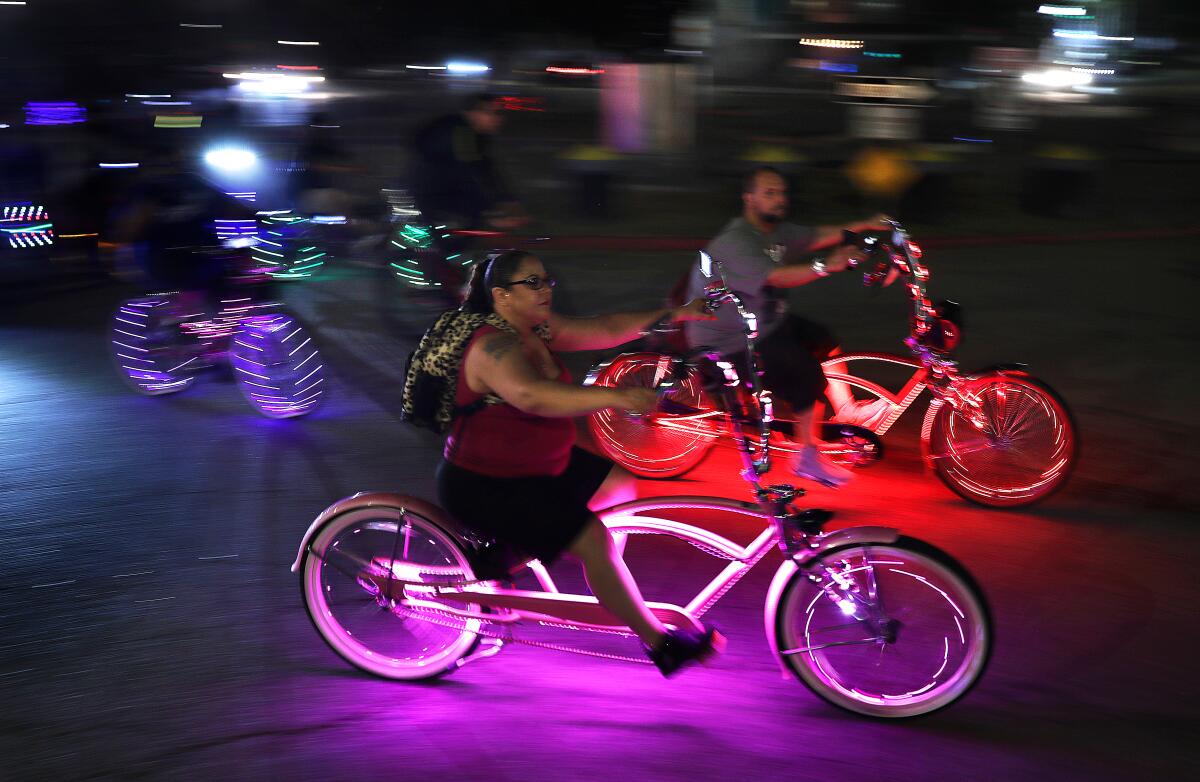
(Christina House / Los Angeles Times)
It doesn’t take long to reach Santa Monica Pier, where we ride underneath and into the parking lot, weaving past startled drivers and tired beachgoers searching for their cars. It’s both beautiful and absurd. Families with excited children wave and call as we head back to the Santa Monica boardwalk and then, a short distance from the tony Shutters hotel, we pass a naked woman writhing to some music only she can hear, seemingly oblivious to the snickering people nearby or the stream of lighted bikes.
The music of the parade changes depending on where you ride, since every fourth bike seems to have its own sound system. If you gawk too much, you fall behind, and Pablo Nieves, one of Gladney’s many parade road monitors, gently encourages you to keep up.
Nieves describes himself as a disabled veteran who boxed for the U.S. Army and earned titles as the European champion. He’s 64 now and gets Botox shots every 30 days to help relieve his terrible headaches. But riding his bike every Sunday is a big help too.
“I help Marcus. Marcus is my buddy,” says Nieves. “And I’m here every Sunday at sunset. I tell people, it’s the place to be anytime you want to get out of your head.”
::
It all seems lighthearted, but for Gladney and his partner-girlfriend, Sherry Fefee, Sundays are a lot of work. There’s no charge to be in the parade, but a few years ago short-term rental companies told Gladney that their tenants wanted to join the parade but couldn’t find bikes to ride. Most beach rental shops close at sunset, so Gladney made the plunge: He purchased 15 bikes, wrapped them with lights and rents them out for $80 a night. He and Fefee live in downtown L.A., so they rent a large storage unit in Venice, about a mile from the boardwalk, and keep all their bikes there.
Setting up takes effort and time. They arrive in Venice a couple of hours before the parade starts to check in renters and get them comfortable on their bikes.
Gladney calls Fefee the “backbone” of his parade, and their Sunday routine is set like clockwork. Fefee also works 12-hour shifts as a nursing director in Orange County. During the height of the pandemic she was getting 15 to 18 calls a night about COVID patients, he said, so while the parade is work, it’s also therapy. “She needs the parade to clear her mind.”
Gladney markets the parade and the bike rentals on social media, and even had a Muppet-style puppet, complete with white dreads, designed in his image to help attract eyeballs. He’s also started designing and building vehicles for Burning Man, a nine-day arts-and-community event in the Black Rock Desert of Nevada, where fanciful LED-encrusted bikes are de rigueur. “At Burning Man, he who has the brightest bike gets the most women ... or most guys,” he said.
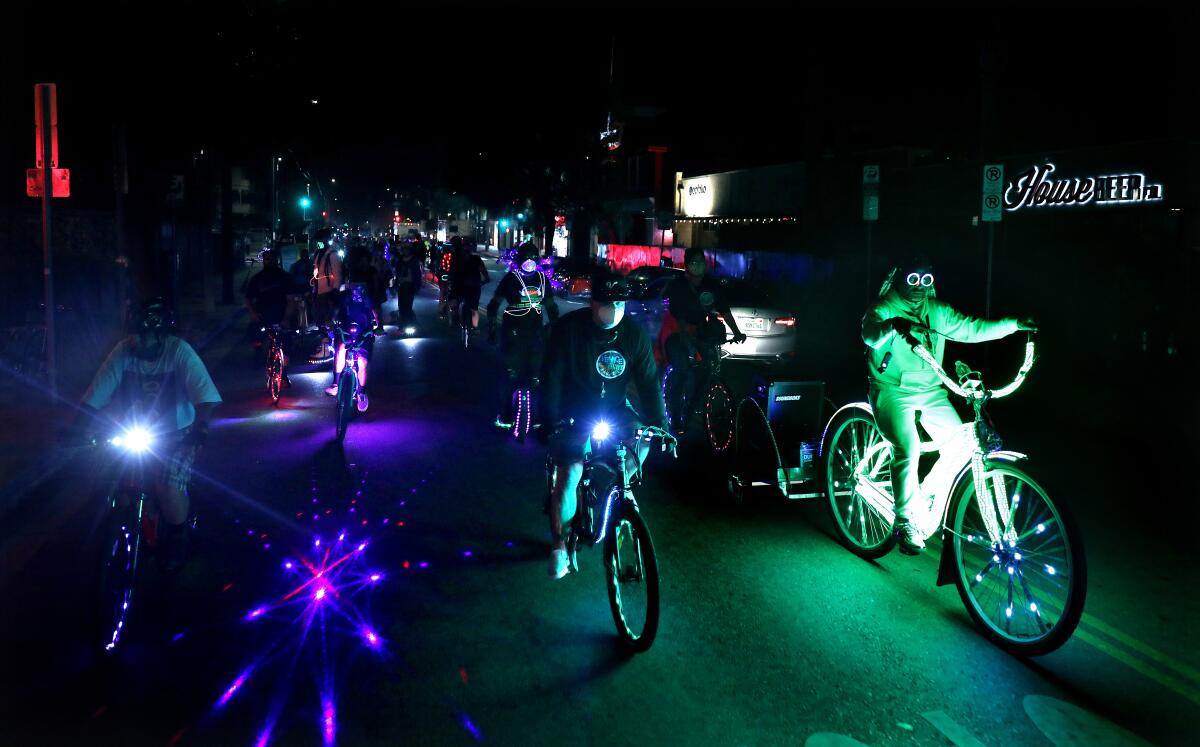
Some cyclists in the Venice Electric Light Parade even have devices that project light and shapes on the pavement as they ride.
(Christina House / Los Angeles Times)
The pandemic shut down Burning Man this year, but Gladney has even bigger goals. “I’ve been doing the parade for five years, and I know I can’t do it forever.” Eventually, he’d love to lead night rides in other parts of the city, to promote safe cycling at night, but more than anything he’d like to create an animated television show based on the Venice Electric Light Parade.
“It would feature us in real time, in real life, riding under the Venice sign, and then switch to live-action animation where we all turn into little kids on bikes, promoting safe cycling at night, teaching us how to be good people and solving problems, like finding a lost dog or helping a cat stuck up in a palm tree.”
He envisions a wholesome show like an old-style Saturday morning cartoon, one that teaches responsibility and values, “that even homeless people who may have made bad decisions are still humans deserving of our kindness, and that police officers are really our friends.”
Gladney said he aspired to be a state trooper before he dropped out of college, and he has a close friend who works as a police officer. He’s watched the protests outside his downtown apartment, but he hasn’t gotten involved. The Black Lives Matter movement troubles him “because all lives matter to me,” he said. “I have a soft spot for people because I know everybody has a mom, everybody has a dad.”
::
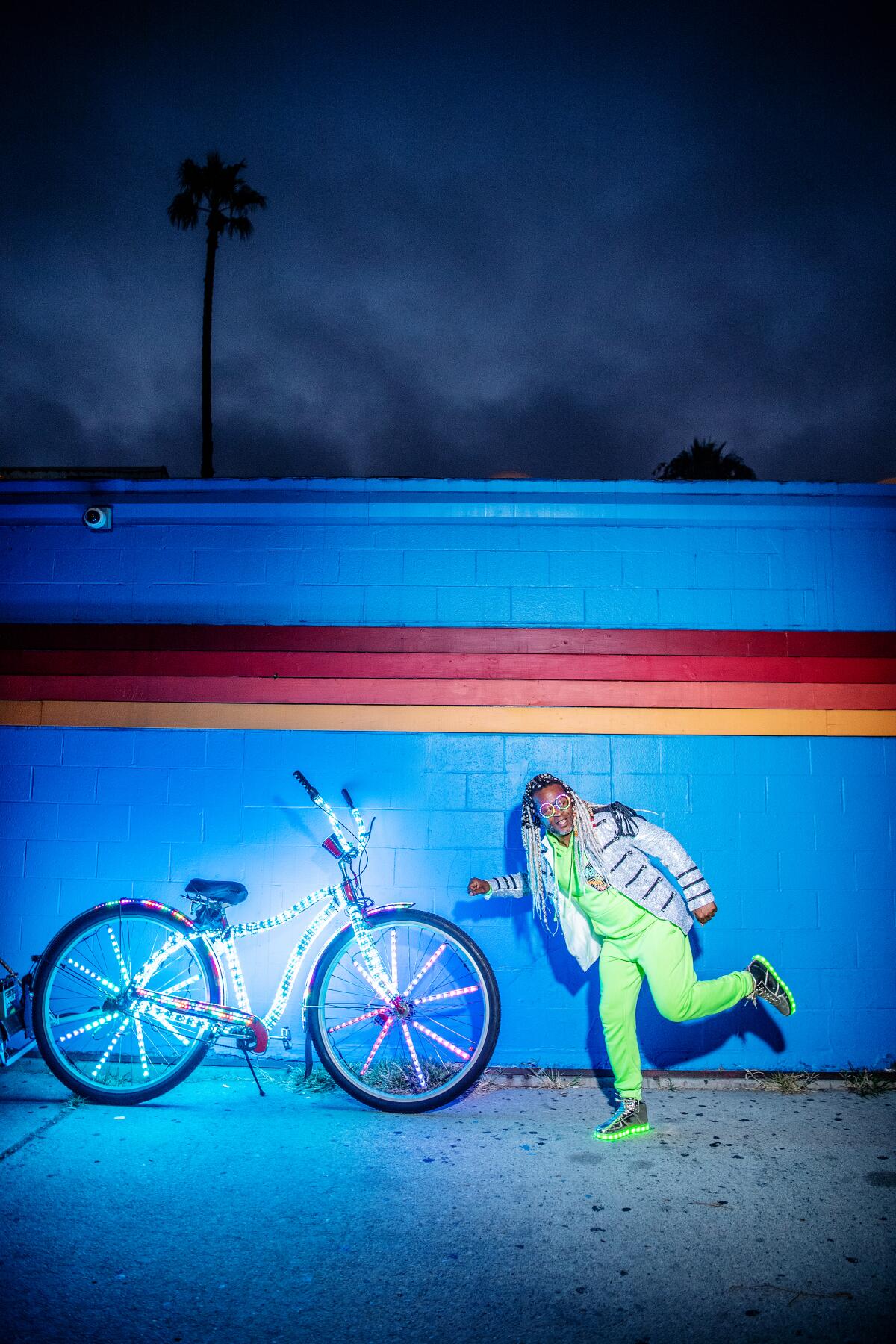
(Mariah Tauger / Los Angeles Times)
Unlike many of the people wandering the boardwalk, most parade participants start the parade wearing a mask, but we quickly learn it’s hard to bicycle any distance wearing a mask, especially with glasses on. They get so fogged up it’s impossible to see the road ahead, so many people who started with a mask are now riding with faces free to the wind. We’re separated enough that it feels safe, until we stop and crowd together waiting for a light. We are still fairly separated by our bikes, but some people fumble for their masks as we wait.
A quick whirl around the traffic circle at Windward Avenue and we’re heading back to the boardwalk, this time toward our final destination, the end of West Washington Boulevard in Marina del Rey. After all the fantastical lights of the bikes, the normal lighting outside the block’s restaurants and bars seems garish and a little sad. Gladney walks through the crowd, telling everyone it’s the official end of the parade, but he can’t linger here. Some people will stay to drink and socialize, but he and Fefee and all their bike rental people have to ride a few more miles back to the storage unit.
Everyone’s tired and a bit subdued by the time we arrive. Gladney hands out a souvenir shirt to one of the renters as the others limp to their cars. But this is a sweet fatigue, and the exhilaration of the ride lingers.
“This is about people having a good time,” Gladney says, “and loving one another.”
